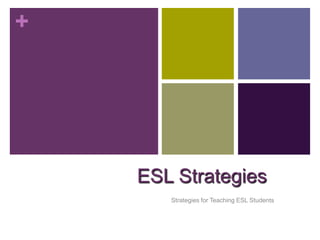
Strategies for Tutoring English Language Learners
- 1. ESL Strategies Strategies for Teaching ESL Students
- 2. Who are Refugee Students as Language Learners? They may not be literate in their first language. They may have NO FORMAL educational background. They may have difficulty understanding academic vs. social English. They may compensate for failure with apathy. They may feel completely overwhelmed.
- 3. English Language Acquisition:English is Crazy! There is no egg in eggplant nor ham in hamburger; neither apple nor pine in pineapple. We take English for granted. And why is it that writers write but fingers don't fing, grocers don't groce and hammers don't ham? If teachers taught, why didn't preachers praught? If a vegetarian eats vegetables, what does a humanitarian eat? Why do people recite at a play and play at a recital? Ship by truck and send cargo by ship? Park on driveways and drive on parkways? Have noses that run and feet that smell? How can a slim chance and a fat chance be the same, while a wise man and a wise guy are opposites? You have to marvel at the unique lunacy of a language in which your house can burn up as it burns down, in which you fill in a form by filling it out and in which an alarm goes off by going on. -Unknown
- 4. WHAT IS LANGUAGE ACQUISITION? “Acquisition requires meaningful interaction in the target language – natural communication – in which speakers are concerned not with form but with the messages they are conveying and understanding. The best methods are therefore those that supply ‘comprehensible input’ in low anxiety situations, containing messages that students really want to hear. These methods do not force early production in the second language, but allow students to produce when they are ready.” Stephen Krashen
- 5. Stages of 2nd Language Acquisition 1. Pre Production Silent period. Repeat (not producing/parroting). TPR/listening activities 2. Early Production One or two word phrases. Short language chunks/memorized. Yes/no questions Pictures/realia Key vocabulary 3. Speech Emergence Communicate in simple phrases and sentences. Able to do content work with support. Match vocabulary with definitions Two-step directions 4. Intermediate Fluency Complex sentences. Express opinions. Should be able to participate in regular content with support
- 6. How is language acquired at all levels? Attention is given to background knowledge/‘schema’. The context and language are real and purposeful. Language is made comprehensible. Anxiety is low. Interaction is high—Active Participation!!
- 7. Is this Reading? A krinklejup was parling a tristlebin. A barjam stipped. The barjam grupped “Minto” to the krinklejup. The krinklejup zisked zoely. What was the krinklejup doing? What stipped? What did the barjam grup? How did the krinklejup zisk?
- 8. What can you do? Strategies to Provide Language Support: Wait Time. Comprehensible Input. Modification of Speech. Reading and Questioning. Vocabulary Support.
- 9. WAIT TIME Length of time between utterances during an interaction. The length of time a teacher waits for a student to respond before interrupting, answering a question themselves, or calling on someone else to participate. The average length of wait time in a US classroom is NOT sufficient. Teachers/Tutors are often tempted to FILL the silence! Effective language teachers/tutors consciously allow students to express their thoughts fully, without interruption. ELL’s need extra processing time- process question in English, think of answer in their first language, and then formulate their response in English.
- 10. COMPREHENSIBLE INPUT Use visuals, realia, gestures, facial expressions, and body language. Build on prior knowledge—and build new academic background knowledge. Contextualize ideas in real life situations. Repeat and rephrase key concepts. Maintain low anxiety and inhibition levels. Encourage active participation.
- 11. MODIFY YOUR SPEECH!!! HOW??? Speak clearly using authentic natural speech. Use shorter, less complex sentences for students in the earlier stages. Use a slightly slower rate of speech—being careful to maintain the natural rhythm and flow of the language. Use intonation, volume, and pauses to aid meaning.
- 12. QUESTIONING STRATEGIES Ask questions with the answer in them. “Was he scared or angry?” Ask, “What is one thing you understand from this,” or “What is one thing you have learned?” DON’T ASK: “Do you understand?” (Students often smile and say yes) READING STRATEGIES Use a bookmark to cover up the text so the student sees only one line at a time. Check for comprehension every so often. It’s okay to summarize passages for students. Rephrase academic questions into simpler forms.
- 13. VOCABULARY Vocabulary –lack of it—is often one of the biggest challenges for English Language Learners. Identify the key vocabulary for the students. During content lessons/tutoring (Math, Science, S.S.) focusing on key vocabulary is essential for accessing the content. Repeat the key vocabulary at the beginning, middle, end of the tutoring session—“…students need minimally 4 exposures to new content no more than 2 days apart to best ‘store’ new information”. (Marzano). Have the students repeat the key vocabulary in context throughout the lesson! Quiz/Question/Converse with students at the end of a lesson to convey their understanding!